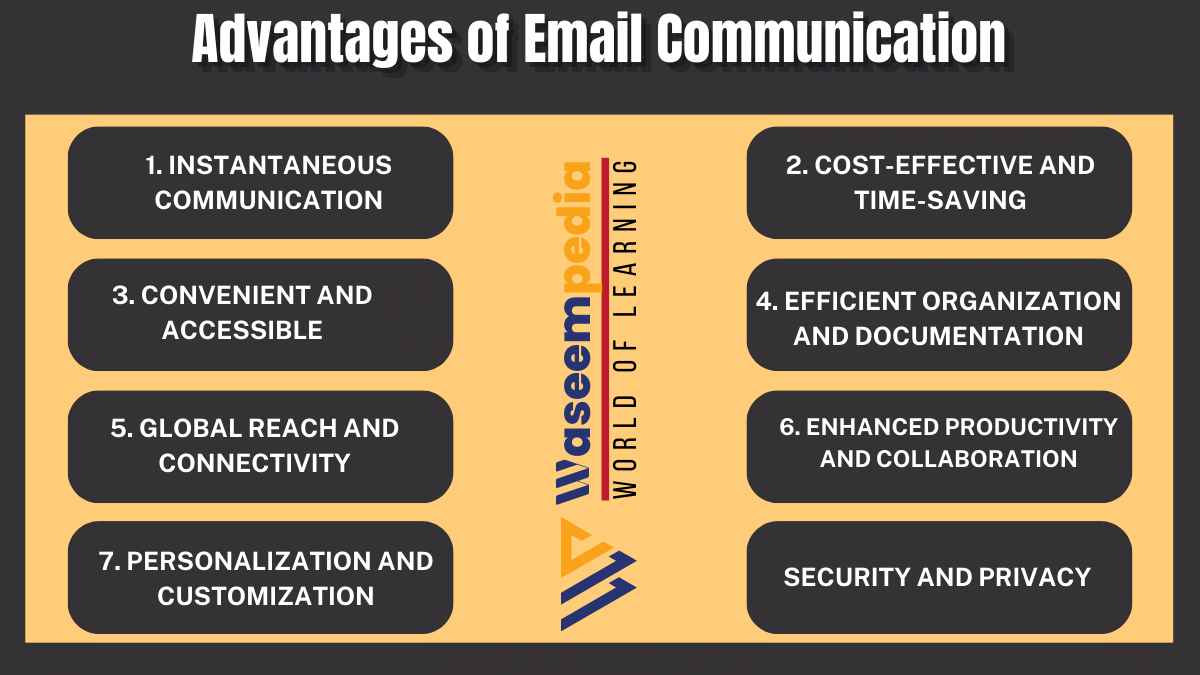Email is a powerful tool with numerous advantages for efficient business communication. Its speed, versatility, professionalism, documentation capabilities, collaboration features, time management benefits, cost-effectiveness, global reach, and security make it a top choice for businesses worldwide. By leveraging the potential of email, organizations can enhance their communication, boost productivity, and fortify overall business operations.
In today’s fast-paced business world, effective communication is crucial for success. While various communication channels exist, email remains a fundamental pillar of business communication, providing a host of advantages that streamline processes, improve collaboration, and boost overall efficiency. This article delves into the benefits of using email for business communication, highlighting its swiftness, flexibility, professionalism, and robust documentation features.

Clear and efficient communication forms the backbone of any thriving business. In the digital age, email has emerged as an essential tool for business communication, offering several advantages that make it a preferred choice for professionals across diverse industries.
9 Advantages of Email for Business Communication
9 Advantages of Email for Business Communication are as following.
1. Speed and Instant Delivery
Email is incredibly fast and delivers messages instantly. When you send an email, it reaches the recipient within seconds, no matter where they are in the world. This speed allows for real-time communication, making it easy to have quick discussions, make important decisions, and collaborate efficiently with colleagues and clients.
Whether you need to share an urgent update, respond to a time-sensitive query, or coordinate with team members, email’s instant delivery ensures that everyone stays connected and informed promptly.
2. Versatility and Accessibility
One of the greatest advantages of email is its versatility and accessibility. Unlike traditional communication methods, email is not limited to text-based messages. You can easily attach various types of files, such as documents, presentations, spreadsheets, images, and even audio or video files.
This versatility enables businesses to share and collaborate on different types of content seamlessly, enhancing productivity and teamwork. Moreover, email can be accessed from various devices, such as desktop computers, laptops, smartphones, and tablets. This ubiquitous access ensures continuous connectivity and communication on the go, allowing you to stay connected and responsive no matter where you are.
3. Professionalism and Formality
Email is widely recognized as a professional and formal communication medium in the business world. When composing an email, you have the opportunity to craft well-structured and thought-out messages. Paying attention to proper grammar, tone, and formatting contributes to a positive brand image and enhances credibility in business interactions.
Using email professionally fosters strong and respectful business relationships. Whether you are communicating with clients, colleagues, or business partners, maintaining a professional tone in your emails creates a lasting impression and shows that you take your work seriously.
4. Documentation and Record-Keeping
Another significant benefit of using email in business communication is its ability to serve as a reliable documentation and record-keeping tool. Every email you send or receive is automatically archived, creating a searchable history of your conversations and transactions.
Having a comprehensive record of past email interactions allows you to easily reference past discussions, retrieve important information, and maintain a clear audit trail for legal and compliance purposes. This documentation can be invaluable in resolving disputes, clarifying agreements, or recalling important decisions made in the past.
5. Efficient Collaboration
Email plays a crucial role in facilitating efficient collaboration within teams and across departments. One of its strengths is the ability to include multiple recipients in an email conversation. This feature enables seamless sharing of ideas, feedback, and updates among team members, leading to effective collaboration and improved decision-making.
Additionally, threaded email discussions ensure that all relevant information is captured and organized in one central location. This avoids information getting lost in the shuffle and allows everyone involved to stay on the same page.
6. Time Management and Prioritization
Managing time effectively is essential in any professional setting, and email offers valuable tools for doing just that. Email clients often include features to help you organize your messages. You can create folders or labels to categorize emails based on their topics or importance, making it easier to sort and find specific messages.
Flagging or marking options in email clients allow you to prioritize important messages and set reminders for follow-ups. This time management capability ensures that critical information and tasks receive appropriate attention and helps you stay on top of your busy schedule.
7. Cost-Effectiveness
Email proves to be a cost-effective communication solution for businesses. Compared to traditional methods like postal mail or phone calls, sending emails incurs minimal costs. It eliminates the need for expenses related to printing, paper, envelopes, postage, and long-distance calling.
Furthermore, email reduces the need for physical storage space required for paper-based documents, leading to additional cost savings for businesses. This cost-effectiveness allows companies to allocate their resources efficiently and invest in other essential areas of their operations.
8. Global Reach and Time Zone Flexibility
One of the most remarkable advantages of email is its ability to transcend geographical boundaries. With email, businesses can communicate and collaborate with partners, clients, and colleagues all around the world.
Regardless of the time zone differences, email ensures that messages can be sent and received at any time, allowing for flexible communication and minimizing delays caused by geographical constraints. This global reach facilitates international business relationships, expansion, and the possibility of providing 24/7 services or support to customers in different regions.
9. Security and Confidentiality
Email services take security seriously to protect sensitive business information. Encryption protocols are utilized to ensure that messages and attachments are transmitted securely, safeguarding them from unauthorized access or interception by malicious entities.
Additionally, many email platforms provide additional security features like password protection and two-factor authentication, further enhancing data security and confidentiality. These measures instill confidence in businesses and clients, knowing that their communication remains private and protected.

